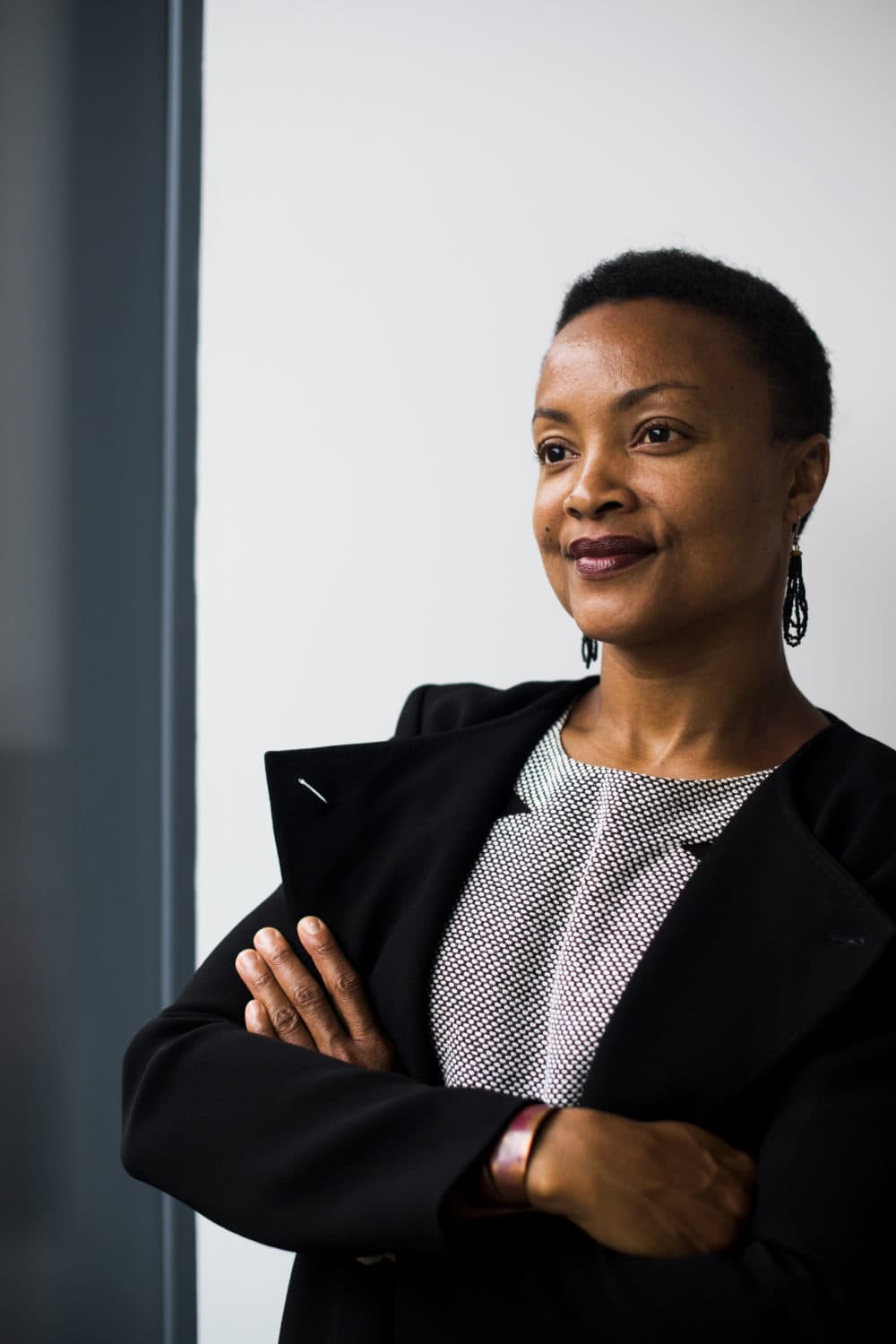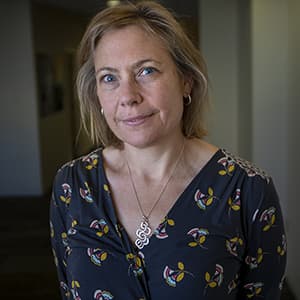Advertisement
'It's Not Inevitable That This Will Be Unjust': A Q&A With Shalanda Baker On Energy Justice
Most discussions of institutional racism focus on schools, housing and the criminal justice system. But our energy system – how we power our lights and gas up our cars – can also enforce racism. That’s because most of our energy comes through a system of “extraction and pollution” – we take stuff out of the ground, burn it to make energy, and dump the pollution somewhere — usually in a poor neighborhood or community of color.
The next decade offers an opportunity to upend that system, as the world switches from fossil fuels to renewable energy sources, like solar and wind. And while energy policy may seem a long way from the fight for racial justice, Shalanda Baker argues that it's a critical part of the discussion.
"The energy system is not immune from this broader reckoning with racial and social justice," Baker, a professor of law, public policy and urban affairs at Northeastern University, says.

Baker is also co-founder of the Initiative for Energy Justice, a group of lawyers who work with policymakers and frontline environmental justice communities on energy equity issues.
Baker sat down with WBUR to discuss energy justice and her new book, "Revolutionary Power: An Activists's Guide to the Energy Transition." The book intertwines family history — her father's encounters with the fossil fuel industry, as well as her own upbringing — with Baker's experience studying energy policy in Mexico and Hawai'i.
The conversation has been edited for length and clarity.
Right now, the nation is trying to reckon with the storming of the U.S. Capitol and the horrific number of coronavirus deaths. It can be really hard to see past these things and think about energy justice. But a lot of the themes you hit on in the book are the same ones underlying the news, right?
Yeah, absolutely. I see the issues of the energy and environment through the prism of George Floyd. Going back to May 25, [2020], when George Floyd was executed publicly by the police system, we saw this very open display of white supremacy. But George Floyd had heart disease, he had asthma, and he was also COVID-positive, as the autopsy report later revealed.
And you know, he grew up in the third ward of Houston, which is a predominately Black community that is also an environmental justice community. COVID has had a disproportionate impact on Black and brown people. And we know that folks are more likely to die if they have an increase of exposure to air pollution. So the people who are more likely to experience the most devastating impacts of COVID from a physical standpoint are Black and brown.
And we know that communities of color are routinely paying more in terms of overall household expenditures on energy. Communities of color are more likely to have experienced what's called "energy insecurity," which is the inability to meet household expenses and particularly, pay for energy needs.
And so this pandemic is impacting our communities physically as well as structurally and economically, in large part due to the design of our energy policy — locating fossil fuel generation in communities of color, and energy and electricity rate design that disproportionately burdens the poorest Americans. So again, George Floyd is the embodiment of this moment.
You have this very powerful and passionate way of discussing the energy system. And that's hard to square with impersonal stuff like ... wires and cables and light switches. It all seems very abstract.
For a lot of communities of color, and a lot of poor white communities in places like Appalachia, the energy system is not an abstraction. We know very well from our research that Black and brown people, particularly Black communities, are more likely to live in the shadows of fossil fuel generation than their white counterparts. And so for them, the system is not an abstraction.
That idea of "living in the shadows of fossil fuel generation" brings to mind a story my mom told me. My grandfather was a steel worker, and when my mom was a little girl she'd look out the window at the mill, with all the smoke and fire and say, "Daddy, is that Hell?" And he said, "No, that's where I work."
The first chapter of the book is all about that. These industries can be a benefactor to certain communities, but at what cost? Louisiana's Cancer Alley, for example, creating so many different types of devastation in certain communities. That's the perversion — it's like, "Oh, do you want economic development? If you do, you have to take it with all of this pollution and other things."
You argue that we can change the energy system in a way that doesn't sacrifice anyone's health or welfare. It's hard to imagine a system that's so radically different from what we've always known.
I think we have to be creative. We're so locked into these old models where, you know, there's always going to be someone on the short end of this. But I think energy, the energy transition, lends itself to the possibility of justice — because you can put solar on rooftops, because people can come together to own a project that will power their community. It's not inevitable that this will be unjust. We can change it. I think this is a remarkable opportunity to really take back the energy system in service of those who've been on the bottom.
How might things be different over the next couple of years? What could happen, and what should happen?
I think first: siting. So, you know, I started my career looking at the way that large energy infrastructure was routinely sited in indigenous communities in particular, but also in Black and brown communities.
And so I think we can rethink how to site large energy infrastructure. And if we're left with few choices as to where we can site infrastructure, then we need to examine the ownership model.
What does that mean, "examine the ownership model"?
So, if I'm going to have energy infrastructure in my own backyard, then I should be able to receive some true economic benefits from that investment. This sounds radical, but it's done routinely around the world.
The other vision I have is one of resilience, where folks are able to disconnect and connect to the grid as needed. There's no reason for entire communities to have a blackout when a hurricane happens 50 miles away. So we need to rethink resilience, particularly in this climate era.
We saw Puerto Rico's grid get wiped out, and that's an example of what can happen with climate change because we're getting bigger storms. And the folks who don't have money in the bank, can't go to a hotel, can't buy a generator — which is problematic anyway because it usually runs off fossil fuels — are least able to bounce back. I have a vision where we have a real shared ownership of energy resources and we have a real commitment to move resources to communities that don't have the ability to bounce back.
You talk a lot about community solar in your book, but it's not really happening in the U.S. in any widespread way. What's been standing in the way?
I would actually trace the root cause to access to finance, access to credit. So if we think about rooftop solar, for example, communities of color are not always able to go to their bank account and pull out money to buy rooftop solar panels. They're often not at the top of any solar company's list in terms of creating a lease program for solar panels. And they're not able to just go to the bank and get a solar loan, because they're not — putting this in quotes — "attractive" customers.
Now, if there were say, "green banks" that can lend money and think about the credit risk in a more creative way, we would be able to get more community solar projects off the ground. I think the federal government has a lot of leeway to think about creating a federal green bank model.
How did you decide to write this book now? It seems like this topic is really having a moment.
There are so many things that don't make sense about my life as a corporate lawyer -- I'm a Black woman, a queer woman from a single-parent family — so in some ways, it doesn't make sense that I would write this book. But I just felt that there was an urgency around this topic.
When I was in Hawai'i in 2014, and in Mexico back in 2010, I saw that we were basically justifying injustice by saying we have to avert catastrophic climate change. In Hawai'i, the system was being written right before my eyes. We were designing a new energy system, but we were doing so in a way that was infected with all of the problems of the old one.
And around the country, we're seeing our aging electric infrastructure. We're seeing things like Puerto Rico and Sandy that are showing us the vulnerabilities of our electricity system. And rather than thinking through issues of equity, all they're saying is, "well, let's just put all the same stuff back in place." And I'm like, "No, no, no, it didn't work!" It seems to me the climate emergency makes this so urgent, and it's a phenomenal opportunity to really do this in a way that is just.
So I can't explain exactly why I wrote the book now. All I know is I was called to do the work, and I was called to tell stories. And so I take that call very seriously. And when I sat down to write, I felt my father with me, and he was like, "tell this story." I thought my mother was me, and she was just like, "you have my permission to share our story as a family." And so I take all of that with such honor and humility. And that's where I landed.
